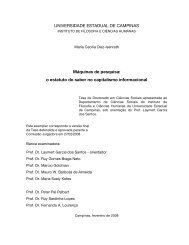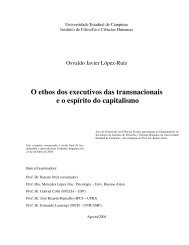As serpentes e o bastão: tecnociência, neoliberalismo e ... - CTeMe
As serpentes e o bastão: tecnociência, neoliberalismo e ... - CTeMe
As serpentes e o bastão: tecnociência, neoliberalismo e ... - CTeMe
Create successful ePaper yourself
Turn your PDF publications into a flip-book with our unique Google optimized e-Paper software.
quality of research in universities. But we realise the need to do more still to<br />
promote world class excellence and this will be a priority for us in the period<br />
ahead. <strong>As</strong> a result, we are seeing an improvement in the quality of our<br />
laboratories [...] Also, science is a thoroughly globalised endeavour, one in<br />
which Britain can and must play a key role. [...] Science is both internationally<br />
competitive and internationally collaborative.<br />
[...]<br />
Government and business support for scientific research is not enough on its<br />
own. We also need to make sure that scientific innovation gets translated into<br />
applied uses in business. [...] So we are establishing strong links between<br />
universities and business through specific schemes [...] But more general<br />
initiatives too are helping lead to a major cultural change in higher education.<br />
A recent survey showed that in 1999-2000, 199 companies were spun off from<br />
our universities [...] And the percentage of university research funded by<br />
industry was higher than in the US.<br />
[...]<br />
Biotechnology is at the forefront of these developments. The biotech industry's<br />
market in Europe alone is expected to be worth $100 billion by 2005. [...] And<br />
Britain leads Europe: three-quarters of the biotechnology drugs in late-stage<br />
clinical trials in Europe are produced by British companies. With our excellent<br />
science base, our sophisticated capital markets and venture capital industry, the<br />
large number of skilled scientists and managers in our pharmaceuticals sector,<br />
and the investment in research by the Research Councils, Wellcome Trust and<br />
others, Britain is well placed to keep and extend its lead.<br />
What's more, [...] nanotechnology and plastics electronics have the potential to<br />
penetrate global markets in the same way. [...] So Britain can benefit<br />
enormously from scientific advance.<br />
But precisely because the advances are so immense, people worry. And, of<br />
course, many of these worries are entirely serious. [...] Humanity has, for the<br />
first time, the capacity for vast prosperity or to destroy itself completely.<br />
People have an understandable concern about the pace of change, about the<br />
new and the unknown. They are concerned that technology dehumanises<br />
society. They are concerned by their belief that scientists contradict each other,<br />
or can be unreliable. And about what they see as the inability of Government to<br />
regulate science properly.<br />
In some cases, these concerns descend into a fear, which is amplified by parts<br />
of the media.<br />
Some of these concerns are not new. [...] Lightning conductors, invented by<br />
Benjamin Franklin, were initially torn down, even from churches, because it<br />
was believed they thwarted God's will. There were riots in the streets when the<br />
smallpox vaccine was introduced. Smallpox has now been eliminated. In the<br />
early days of heart transplants they were attacked as unnatural or<br />
dehumanising, but in surveys today heart transplants are seen as one of the<br />
most beneficial results of modern science.<br />
Sometimes science is wrongly blamed for the faults of others. [...] Bad science<br />
didn't cause the spread of BSE; it was bad agriculture and poor government.<br />
The response of the government must be to encourage openness, transparency<br />
and honesty. The Food Standards Agency, which operates in an area of<br />
particular public concern and sensitivity, holds meetings in public<br />
[...]<br />
And there are lessons to be learnt from the way that we handled the embryonic<br />
stem cell debate. Firstly, we established the scientific facts very carefully, with<br />
the authoritative report by the Chief Medical Officer in August 2000.<br />
There was then a lengthy discussion which gave time for all groups, including<br />
the medical charities, to make their views known, and this led to a very<br />
365<br />
neoliberal...<br />
Ciência global<br />
Ciência empreendedora: a<br />
ciência serve quando serve<br />
para a nação, isto é, o<br />
mercado...<br />
A universidade também<br />
deve seguir esse rumo:<br />
universidade<br />
empreendedora,<br />
inovadora...Até parte dos<br />
fundos das universidades<br />
deve chegar do setor<br />
privado...<br />
Os benefícios da ciência,<br />
então, são instrumentais,<br />
técnicos: produtos, bens,<br />
serviços, emprego,<br />
dinheiro<br />
Mas as pessoas estão<br />
preocupadas... ou têm<br />
mesmo medo...<br />
Anti-ciência<br />
Glasnost: diálogo,<br />
abertura...<br />
governamentalidade<br />
neoliberal<br />
Como fazer: primeiro, os<br />
“fatos” científico;<br />
segundo, longa discussão<br />
com os “grupos”...





